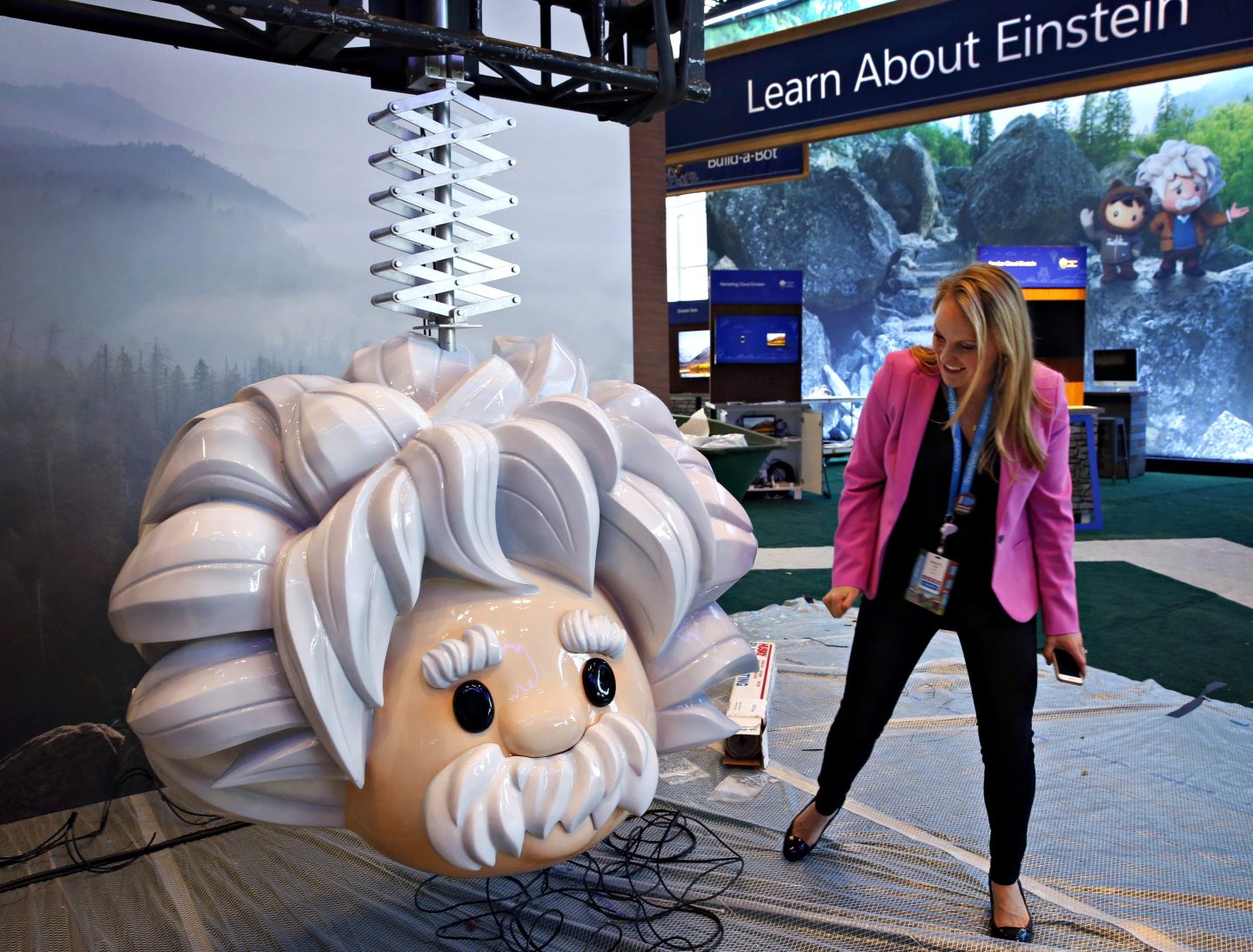If you had any doubts about just how quickly generative A.I. is going to encroach into our lives, now’s the time to drop them, because Salesforce and Microsoft are injecting the technology into their customer relationship management services—and more.
Microsoft went first yesterday with the announcement of Dynamics 365 Copilot; then Salesforce this morning with the evolution of its Einstein AI into “Einstein GPT.” Get ready to start receiving sales emails that aren’t just A.I.-optimized to reach you at the right time and with targeted content, but that have also been artificially authored. Customer service bots are getting souped up with generative A.I., too.
Microsoft’s Copilot will help you generate product listings for e-commerce sites, and is even being integrated into the firm’s supply-chain management software to “proactively flag external issues such as weather, financials, and geography that may impact key supply-chain processes”—it can then draft emails to affected supply-chain partners, to warn them of disruptions.
Salesforce, meanwhile, is also offering developers an A.I. copilot (though it doesn’t use that term) that can generate code for them. And yes—ChatGPT is also coming to Salesforce-owned Slack.
The big winner here is OpenAI, which is heavily backed by Microsoft, so no surprise to see its technology used on that side. Salesforce’s big pitch is that Einstein GPT will combine Salesforce’s own A.I. models (and of course its own cloud) with external models, such as OpenAI’s—it’s all about the ecosystem, and this is just the first integration.
OpenAI CEO Sam Altman said the use of his firm’s technology in CRM services “allows us to learn more about real-world usage, which is critical to the responsible development and deployment of A.I.—a belief that Salesforce shares with us.” To that end, Salesforce is also launching a $250 million venture fund for the development of “responsible, trusted, and generative A.I.”
It will be fascinating to watch how this plays out. On the one hand, we’re now in the territory of serious businesses using generative A.I. for serious things, as opposed to playing around to see how long it takes to get a chatbot to say something offensive. On the other hand, some of these applications involve customers who may have some curveball questions. And it’s worth remembering that generative A.I. technology like OpenAI’s ChatGPT will occasionally “hallucinate,” that is, basically make up fake information.
In theory, Microsoft’s and Salesforce’s new offerings should be safer to use because they only draw on information from companies’ own websites and internal databases—the customer-facing elements will in that sense be a bit like those Google search boxes in websites. But that won’t necessarily make these A.I.s immune to occasionally emitting bogus information. Companies will find out soon enough how carefully they need to monitor their new copilots.
Want to send thoughts or suggestions to Data Sheet? Drop a line here.
David Meyer
Data Sheet’s daily news section was written and curated by Andrea Guzman.
NEWSWORTHY
A.I. for tracking. The FBI and the Defense Department were involved in developing facial recognition tech that they intended to use to identify people from videos used by street cameras and drones, the Washington Post reports. The plans were detailed in internal documents provided in response to a Freedom of Information Act lawsuit the American Civil Liberties Union filed against the FBI. In light of this, Sen. Edward J. Markey (D-Mass.) said he will push again for a bill aimed at restricting how federal agencies can use facial recognition and biometric searches.
Twitter glitch. Users couldn’t view images or access links yesterday, with Downdetector showing more than 8,000 Twitter outage reports at about noon on Monday. Twitter Support pinned the issue on an “internal change,” while CEO Elon Musk described the platform as “brittle.” The latest outage arrives about a month after a different glitch in which users were unable to send tweets.
Meta layoffs. After cutting 11,000 workers in November, Meta is looking at eliminating even more positions. This round of layoffs is driven by financial targets and is separate from efforts to “flatten” the organization, Bloomberg reports. The latest layoffs are expected to be finalized in the next week before CEO Mark Zuckerberg goes on parental leave.
ON OUR TIMELINE
“Companies let people go, that’s within their rights. They usually tell people about it, but that’s seemingly the optional part at Twitter now.”
—Twitter senior designer Haraldur Thorleifsson, who lost access to his work computer for nine days. He received notice on Monday that he’d been laid off after sending multiple emails and tweeting at Elon Musk about the status of his job.
IN CASE YOU MISSED IT
Researchers used artificial intelligence to detect Alzheimer’s risk with over 90% accuracy and could transform how medicine is practiced, by Tristan Bove
Google boss Sundar Pichai says staff are bemoaning office ghost towns—‘It’s just not a nice experience’, by Christiaan Hetzner
Elon Musk’s bodyguards follow him around the office—even to the restroom, Twitter employee says, by Chloe Taylor
Severance agreements just became more favorable to workers. Here’s what that means for employers, by Geoff Colvin
Salesforce CEO Marc Benioff is changing his tune about remote workers: ‘They do better if they’re in the office’, by Nicholas Gordon
BEFORE YOU GO
Geek Squad for health. Electronics retailer Best Buy has partnered with Atrium Health to set up virtual hospital rooms in people’s homes. It’s an expansion of efforts that the electronics retailer has already made in health care since it launched a remote patient monitoring system in 2021. For this latest push, the company is expecting profits to come in slowly. “We are essentially nurturing a startup within a large-scale organization and leveraging Best Buy’s core assets, including the Geek Squad, to incubate a new business,” CEO Corie Barry said. “The revenue contribution is currently very small and will take time to ramp as the care-at-home space matures and expands over the coming years.”
This is the web version of Data Sheet, a daily newsletter on the business of tech. Sign up to get it delivered free to your inbox.












